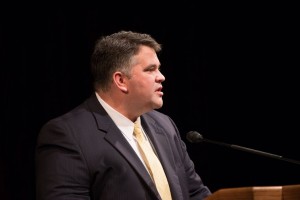A BYU associate professor of English shared with students how to turn weaknesses into strengths through Christ and the need to discern truth from error.
The June 3 address was offered by English professor Trenton Hickman, who has worked for BYU for 14 years. He previously served as an assistant professor and is currently an associate professor for the Department of English.
Hickman focused his remarks on the damaging trend of skepticism and cynicism within the LDS Dhurch.

“Some in our time allow cynicism to convince them that we have no way of knowing anything for sure,” Hickman said. “And many now frame the word ‘truth’ in scare quotes to signal even at the level of punctuation a suspicion of the very notion of truth itself.”
Commenting on the skeptical and unbelieving nature of some in the present day, Hickman added that often even conspiracy theory triumphs systematic intellectual inquiry.
“Such is the widespread societal confusion described by Isaiah,” Hickman said.
To illustrate his point, he quoted 2 Nephi 27, verse 3, which reads, “A dream of a night vision where it shall be unto (us), even as unto a hungry man which dreamt and behold he eateth but his soul is empty; or like unto a thirsty man which dreamt and behold he drinketh but he awaketh and behold he is faint and his soul hath appetite.”
Hickman said language may be, in part, responsible for this confusion described by Isaiah.
“Moroni’s notion that our age, perhaps more than those which have preceded it, would focus on weakness in writing and upon flaws in language generally seems especially prophetic,” said Hickman. “If this flawed language was perhaps constitutive of even our most basic sense of reality we inhabit, how could we trust words to carry truth in the ways that earlier generations had imagined were possible?”
Moroni worried that the placement of his words would cause him to “stumble.” Often our words fall short as to what we are truly attempting to express.
“I suspect that you students have all felt this, too,” Hickman said. “Perhaps late at night, your brain fogged by lack of sleep and the stupor brought on by too much junk food as you try to finish a paper for one of your classes.”
To this universal problem of not being able to express ourselves perfectly, quoting the book of Ether, chapter 12 verse 27, Hickman offered that the Lord has a solution for people like us and Moroni.
“‘I give unto men weakness that they may be humble; and my grace is sufficient for all men that humble themselves before me,'” Hickman said.
He followed up the scripture by sharing his thoughts on how to apply and exert faith.
“(The Lord) underscores the importance of weakness —in this case, both of readerly weakness and writerly weakness — in brining Moroni and his eventual audience to a key choice: Whether or not to choose humility as an opportunity to exert faith and to learn.”
Because our own personal exertion is crucial to learning humility and faith, Hickman urged utilizing the power of the Holy Ghost.
“If the acquisition of knowledge is an act of humility and faith on our part that is powered by personal revelation from the Holy Ghost, then we need to do all we can to take full advantage of the gift of the Holy Ghost in our lives,” Hickman said.
Many times, Hickman used this process of humble and faithful inquiry to find solutions to problems he has had to face at BYU.
In effort to publish an essay that would prove to be a landmark in his career, Hickman said he encountered problems with an editor who also happened to be a close acquaintance. This editor was not satisfied with Hickman’s final draft and told Hickman the project would have to move on with out his work. Hickman then prayed that his work could be satisfactory and shared that he was given the inspiration and revelation which, in the end, made his work publishable.
“Is it strange for a professor to pray over the literary history and criticism that he writes?” Hickman asked. “How is that different, finally, than when Amulek admonishes us to be ‘humble (ourselves)’ and to ‘cry unto (God)’ over our ‘fields, yea, over all (our) flocks … (and) over the crops of (our) fields that (we) may prosper in them’?”
Hickman shared that the Spirit gave him knowledge and language in unexpected, even extemporaneous moments when he needed to be wise beyond his own capacity.
During an academic conference, Hickman recounted, he was asked if he wore “the magic underwear,” referring to the temple garment.
Shocked that he would be asked such a question within a conference populated by educated professionals, Hickman shared his response the the blunt question.
“I told them that from my experience any ‘magic’ that my temple garments impart to me is simply from the blessings I receive for living the good life that I told God I’d live,” Hickman said. “Finally I asked those at the table after a light pause, ‘Do any of you want to talk about your underwear?'”
Concluding his remarks, Hickman shared his hope that all listening would be able to heed the prompting of the Holy Ghost and abide in humility, faith and charity.
“It is my hope that we will have the humility, the faith, the charity and the willingness to receive the gift of the Holy Ghost necessary to be able to see our respective corners of the world shine,” Hickman said. “May we ever pursue true knowledge, eventually finding for ourselves in the journey that all truth indeed is part of one great and eternal round, capacious enough to explain all the mysteries of the universe.”




